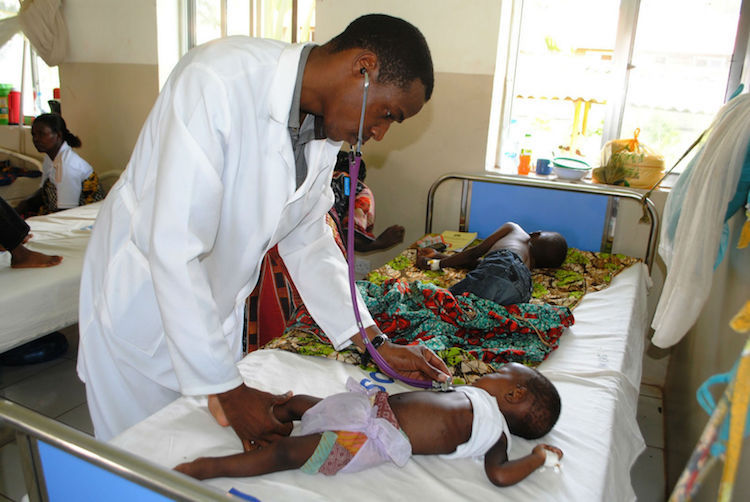By Kizito Makoye Shigela
BAHI, Tanzania (ACP-IDN) – In Bahi, a remote district west of Tanzania’s capital Dodoma, local residents have always expected to donate blood whenever they go to hospital.
“My daughter had acute malaria and she urgently needed blood, yet there was no blood available,” local resident Hawa Ambweni told IDN. She said she had to pay some money to order blood from the district hospital.
“I was quite nervous waiting for the blood to arrive,” she said. “My daughter’s life was in danger.”
After waiting for more than two hours, health workers managed to obtain two units of blood which were administered to Ambweni’s daughter, who fully recovered after a few weeks.
“I was very fortunate, because sometimes the car (transporting the blood) might break down along the way causing further delay,” said Ambweni.
Availability of blood in Tanzania’s rural health facilities is critical in saving patients’ lives but most of them often lack blood supplies, according to health officials.
Every year, an estimated 289,000 women die worldwide from complications related to pregnancy and childbirth. Nearly two-thirds of those deaths occur in sub-Saharan Africa, with severe bleeding as the leading cause (accounting for 24.5 percent of maternal death in the region), says the World Health Organization (WHO).
According to WHO data, out of all maternal deaths from severe bleeding in sub-Saharan Africa, an estimated 26 percent are directly related to lack of an emergency supply of blood.
Women who haemorrhage while pregnant or around the time of delivery are at high risk of dying because, once bleeding has started, death can occur in around two hours, according to health experts.
Tanzania needs at least 450,000 litres of blood every year but officials say that the government currently collects only 140,000 units. In conjunction with the Tanzania Red Cross Society (TRCS), the Tanzania National Blood Transfusion Service (TNBTS) has been engaging local communities on voluntary blood donation to ensure greater survival for pregnant mothers and children.
Now, however, there is an extra glimmer of hope for rural residents. The government plans to deploy drones to supply blood and other life- saving essentials rapidly to hundreds of rural health facilities starting in April this year.
The £400,000 project, funded by the UK’s Department for International Development (DfID) is expected to help save the lives of expecting mothers and newborn babies by drastically cutting the time it takes to send medical supplies to rural health facilities by road or other means.
The project is coordinated locally by the Ifakara Health Institute (IHI) which specialises in treatments for malaria, HIV/AIDS, tuberculosis and neonatal health problems.
Zacharia Mtema, a senior research scientist with IHI, said that under the DfID project ten drones, which will fly at a maximum altitude of 150 metres, will be assigned to deliver blood and other medical supplies from the city’s main blood bank to remote areas, and “this is just the beginning; we are hoping to expand the project to cover many other areas across the country.”
While seasonal floods in Tanzania can make it impossible for cars and motorcycles to deliver emergency blood supplies to health clinics in rural areas in time to save lives, drones can potentially supply blood more than 75 km from the central blood bank in the Dodoma, DFID said.
Evelyne Mgasa, a manager at TNBTS, said the initiative will speed up blood delivery in rural health facilities where women and children die of preventable causes.
According to project manager David McGinty, the drones are capable of carrying up to 1 kg of medical supplies and reducing delivery times to 19 minutes from the 110 minutes it currently takes on average by vehicle.
It is estimated that flying blood and other medical supplies by drone from Dodoma to rural health facilities could save the equivalent of at least 58,000 dollars annually.
The project involves Zipline, a United States-based company which is running a similar service in Rwanda using small fixed-wing aircraft with the capacity of flying up to about 290 km before running out of power.
Through a partnership with the Rwanda government, Zipline has been delivering all blood products for 21 hospitals and health centres since October 2016, improving access to healthcare for the majority of poor Rwandans who reside in hard-to-reach rural areas.
Rwandan government officials say the drones are effectively making around 150 deliveries of blood to the 21 facilities each day
According to Zipline, the small drones, which are fired from a catapult and follow a pre-programmed path using GPS location data, are capable of withstanding windy conditions and stay airborne for longer and descend to heights of about 5 metres to release their loads via paper parachutes.
A health worker can place an order by text message. Within minutes, a Zipline drone is prepared and launched. Flying at 100 kilometres per hour, the drone arrives faster than any other mode of transport. The medical products are then dropped off, landing gently and accurately at the health facility in an open area the size of a few parking spaces, the company said.
“This innovative, modern approach ensures we are achieving the best results for the world’s poorest people and delivering value for money for British taxpayers,” British International Development Secretary Priti Patel said in December 2016.
“I am very happy for this project because poor people like me will no longer have to suffer,” said Ambweni. [IDN-InDepthNews – 08 February 2017]
Note: This report is part of a joint project of the Secretariat of the ACP Group of States and IDN, flagship agency of the International Press Syndicate
Photo: Dr. Alex Magufwa examines a child suffering from severe malaria at Bahi hospital in Dodoma. Cedit: Kizito Makoye Shigela | IDN-INPS

